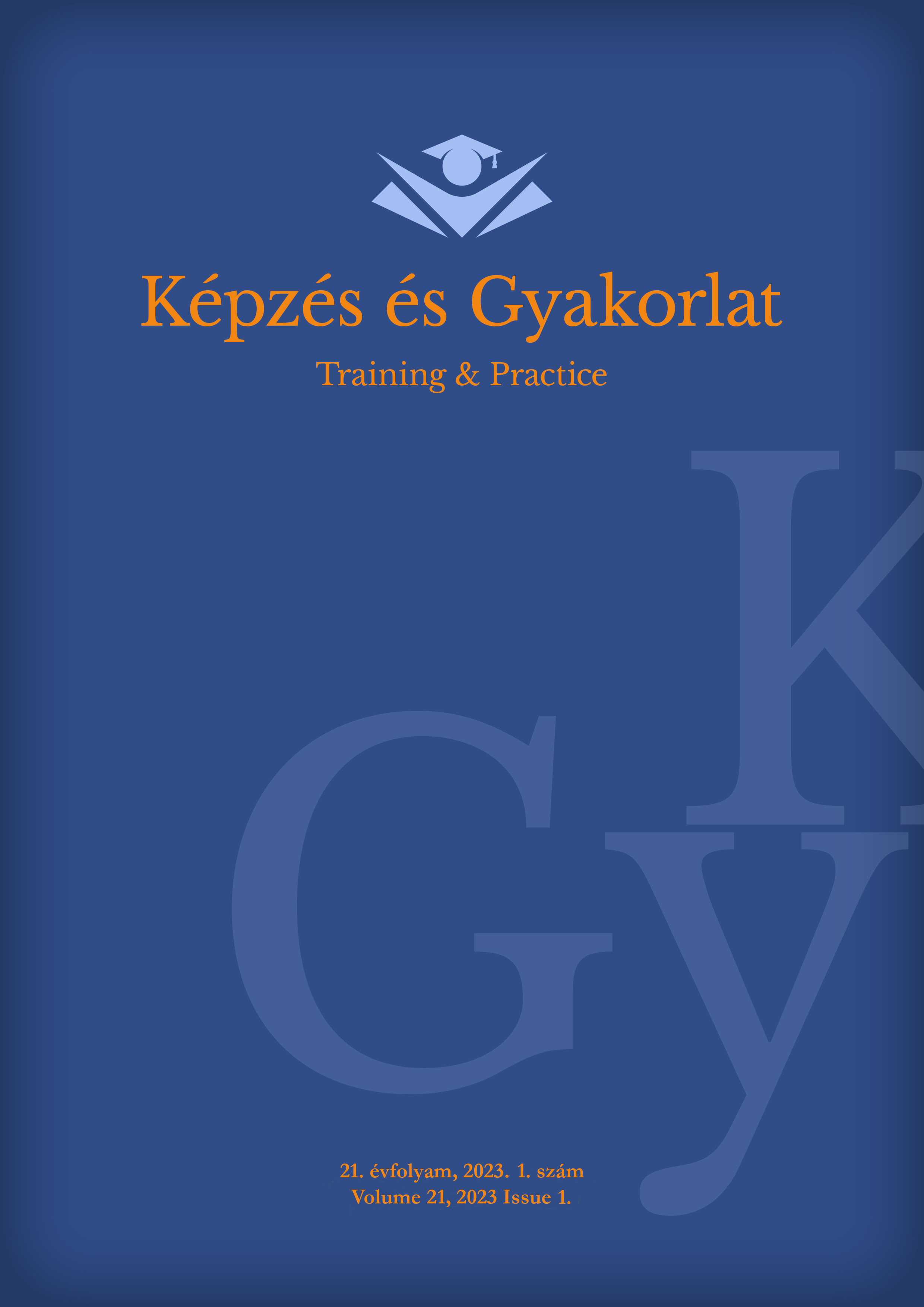Development of life skills: the SUPREM program
DOI:
https://doi.org/10.17165/tp.2023.1.53-62Keywords:
career guidance, life skills, lifelong learning, primary school studentsAbstract
The study focuses on the necessity and the opportunities to develop general life skills related to teenagers' career choices and coping with everyday challenges. The aim is to present the intellectual outputs developed in the framework of the international education development project Successful Preparation Model for Schools (SUPREM), supported by Erasmus+. In this way, it wants to contribute to supporting teachers, parents and students in public education in the period of career choice, in making successful decisions, in choosing pathways to further education according to individual abilities, and in encouraging active involvement in the lifelong learning process.
References
Andor, M. & Liskó, I. (2000). Iskolaválasztás és mobilitás. Iskolakultúra könyvek 3. Iskolakultúra.
Berne, E. (1984). Emberi játszmák. Gondolat Kiadó.
Borbély-Pecze, T. B., Juhász, Á. & Gyöngyösi, K. (2013). Az életút-támogató pályaorientáció a köznevelésben (1. rész). A pályaorientáció új szemlélete és a hazai helyzet. Új Pedagógiai Szemle, 63(5/6), 32–49.
Borbély-Pecze, T. B., Suhajda, Cs., J., Kenderfi, M., Tajtiné-Lesó, Gy. & Juhász, Á. (2020). Pályakonstrukció és pályaalkalmasság. Új Pedagógiai Szemle, 70(9–10), 1-21.
Csapó, B. (2015). A magyar közoktatás problémái az adatok tükrében. Iskolakultúra, 25(7–8), 4–17. https://doi.org/10.17543/ISKKULT.2015.7-8.4
Csapó, B., Fejes, J. B., Kinyó, L. & Tóth, E. (2014). Az iskolai teljesítmények alakulása Magyarországon nemzetközi összehasonlításban. In Kolosi, T& Tóth, I. Gy. (Eds.), Társadalmi Riport (pp. 110–136). TÁRKI.
Énekes, Zs. & Juhász, E. (2013). Önmenedzselési kompetenciák. In Juhász, E. & Pete, N. (Eds.), Civil dimenziók 2.Tréningek a tehetséggondozásban (pp. 38–60). Belvedere Meridionale Kiadó.
Farkas, É. (2017). Segédlet a tanulási eredmények írásához a szakképzési és felnőttképzési szektor számára. Oktatási Hivatal.
Fazakas, I. (2004). Az iskolai pályaorientációs tevékenység új módszertani lehetőségei. Az Eszterházy Károly Főiskola tudományos közleményei (Új sorozat 31. köt.). Tanulmányok a pszichológiai tudományok köréből. Acta Academiae Paedagogicae Agriensis. Sectio Psychologiae, (pp. 151–165).
Gönczöl, E. & Vass, V. (2004). Az oktatási programok fejlesztése. Új Pedagógiai Szemle, 54(10), 10–19.
Kenderfi, M. (2011). Pályaorientáció. Digitális tankönyv. Szent István Egyetem. Letöltés dátuma: 2023. 01. 15. forrás: https://docplayer.hu/4067071-Palyaorientacio-dr-kenderfi-miklos.html
Kennedy, T. J. & Sundberg, C. W. (2020). 21st Century Skills. In Akpan, B., & Kennedy, T. J. (Eds.) Science Education in Theory and Practice. Springer Texts in Education. Springer, Cham. https://doi.org/10.1007/978-3-030-43620-9_32
Kiss, I. (2009). Életvezetési kompetencia. Észlelt életvezetési énhatékonyság mintázatelemzése tanácsadási szolgáltatásokat igénybe vevő felsőoktatási hallgatók mintáján. [PhD-értekezés] Eötvös Loránd Tudományegyetem Pedagógiai és Pszichológiai Kar. Letöltés dátuma: 2023. 01. 05. forrás: http://pszichologia.phd.elte.hu/vedesek/2009/KissIstvn_letvezetsi_kompetencia_ PhD2009k.pdf
Kivunja, C. (2014). Do You Want Your Students to Be Job-Ready with 21st Century Skills? Change Pedagogies: A Paradigm Shift from Vygotskyian Social Constructivism to Critical Thinking, Problem Solving and Siemens’ Digital Connectivism. International Journal of Higher Education, 3(3), 1–11. http://dx.doi.org/10.5430/ijhe.v3n3p81
Koltói, L., Harsányi, Sz. G., Kovács, D., Kövesdi, A., Nagybányai-Nagy, O., Nyitrai, E., Simon, G., Smohai, M., Takács, N. & Takács, Sz. (2019). A szülők tanulmányokba való bevonódásának összefüggése az iskolai teljesítménnyel. Psychologia Hungarica, 7(2), 86–103. https://doi.org/10.12663/PSYHUNG.7.2019.2.6
Lannert, J. & Szekszárdi, J. (2015). Miért nem érti egymást szülő és pedagógus? Iskolakultúra, 25(1), 15–34. https://doi.org/10.17543/ISKKULT.2015.1.15
Lent, R. W., Brown, S. D., Brenner, B., Chopra, S. B., Davis, T., Talleyrand, R. & Suthakaran, V. (2001). The role of contextual supports and barriers in the choice of math/science educational options: A test of social cognitive hypotheses. Journal of Counseling Psychology, 48(4), 474–483. https://doi.org/10.1037/0022-0167.48.4.474
Mahanta, P., Deuri, S. P. & Sobhana, H. (2021). Importance of Life Skills Education among Adolescents. Indian Journal of Positive Psychology, 12(4), 403-406.
Magyar, I., Czövek, A. & Fazakas, I. (2018). Megalapozó tanulmány az életgyakorlat-alapú iskolai programok fejlesztéséhez. Líceum Kiadó.
Pogátsnik, M. (2015). A pályadöntési folyamat, és az ezt alakító tényezők serdülő- és ifjúkorban. EDU 5(2).
Prajapati, R., Sharma, B., & Sharma, D. (2017). Significance of Life Skills Education. Contemporary Issues in Education Research, 10(1), 1–6. https://doi.org/10.19030/cier.v10i1.9875
Rahman, M. M. (2019). 21st Century Skill “Problem Solving”: Defining the Concept. Asian Journal of Interdisciplinary Research, 2(1), 64–74. https://doi.org/10.34256/ajir1917
Rios, J. A., Ling, G., Pugh, R., Becker, D. & Bacall, A. (2020). Identifying Critical 21st-Century Skills for Work-place Success: A Content Analysis of Job Advertisements. Educational Researcher, 49(2), 80–89. https://doi.org/10.3102/0013189X19890600
Shek, D.T., Lin, L., Ma, C.M. S., Yu, L., Leung, J. T. Y., Wu, F. K. Y., Leung, H. & Dou, D. (2020). Perceptions of Adolescents, Teachers and Parents of Life Skills Education and Life Skills in High School Students in Hong Kong. Applied Research Quality Life 16(5), 1847–1860. https://doi.org/10.1007/s11482-020-09848-9
Stöczkert-Kozák, A. (2014). Élethosszig tartó tanulás. Nem csupán tudásátadásról van szó. Média és oktatás. Új Köznevelés, 70(1–2).
Super, D. E. (1984). Leisure: What It Is and Might Be. Journal of Career Development, 11(2), 71–80. https://doi.org/10.1177/089484538401100203
Trilling, B. & Fadel, C. (2009). 21st Century Skills: Learning for Life in Our Times. Jossey-Bass.
UNICEF (2012). Global evaluation of life skills education programmes. Evaluation Report. Letöltés dátuma: 2023. 01. 17. forrás: https://evaluationreports.unicef.org/GetDocument?fileID=241
UNICEF (2019). Boys on the move. A trainer’s handbook for implementation of a life skills programme for unaccompanied adolescent boys and young men. Letöltés dátuma: 2023. 01. 07. forrás: https://www.unicef.org/eca/media/10271/file
Vámosi, T. (2015). Tanoncból mesterember. Szerzői kiadás.
Vass, V. (2009). Az attitűdök forradalma. Iskolakultúra, 19(7–8), 84–86.
WHO (2020). Life skills education school handbook: prevention of noncommunicable diseases - Introduction. Geneva: World Health Organization. Letöltés dátuma: 2023. 01. 17. forrás: https://www.medbox.org/pdf/5ec44a72478c7a5b5c309d23
Downloads
Published
Issue
Section
License
Copyright (c) 2023 Katalin Hégető

This work is licensed under a Creative Commons Attribution-NonCommercial-NoDerivatives 4.0 International License.












